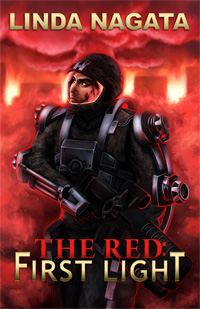Writing the Near Future
April 30th, 2013 My newest novel, The Red: First Light, is a very near-future military thriller that got me thinking again about the challenges of writing near-future fiction. The result is a blog post, up today over at Book View Café:
My newest novel, The Red: First Light, is a very near-future military thriller that got me thinking again about the challenges of writing near-future fiction. The result is a blog post, up today over at Book View Café:
This fear of early obsolescence or “aging out†makes the near future a scary place to set a novel. What’s the lifespan of a book going to be when the associated history is changing even as the novel is written?
Click on over to BVC to read the whole thing.
Posted on: Tuesday, April 30th, 2013 at 7:44 am
Categories: Writing.
Tags: near future, The Red: First Light








April 30th, 2013 at 4:52 pm
Personally I think the lifespan of the book won’t be affected much :-). Just because it may depict a future which is different from the real one doesn’t mean it doesn’t have important ideas or isn’t a good story. Larry Niven’s “The Coldest Place” was out of date before it was published – the story being based on the idea that Marcury was tidally locked with the Sun, and so the “coldest place” was its dark side. More significantly, George Orwell’s “Nineteen Eighty Four” is still a widely read and important piece of literature, despite the differences in how Britain truly was in the real 1984. You can’t be blamed for not knowing exactly what will happen in the future – it doesn’t, in my opinion, make any difference with whether a book is well written or not :-).
Have a great day!
Robert
May 1st, 2013 at 5:58 am
I liked your essay, thought “obvious truth” (which doesn’t mean obvious, someone had to say it, and you get the credit), especially liked “In the end, it’s the strength of the story that matters.”. That’s why we read, for the story.
For a long time I’ve been a big fan of “Worlds of Wonder”, which seems to mostly translate as space opera. Near-future fiction just doesn’t come across as the Undiscovered Country quite like that at great distance. I can imagine living into something near-term…. Let me give you some examples:
* Vernor Vinge, _A Fire Upon the Deep_ — While his computing ideas are firmly grounded in present-day (one-third of a one-time XOR pad, RIGHT), the future with both familiar and really wierd alients is a long jump. And a galaxy where intelligence is stratified by radius, that’s novel. But hyperintelligent (no, no, not pan-dimensional too 🙂 beings feuding, we’ve been there before, Simmons’s _Hyperion_, and many centuries back, the Gods of Olympus contending. Individual elements can be picked apart, no “ahah” moment there. The gestault is for me a World of Wonder.
* Greg Bear, _City at the End of Time_ concludes in a very strange time that pays homage to William Hope Hodgson’s _The Nightland_ (as does his longish story “The Way of All Ghosts”, Bear obviously favors Hodgson). It’s pretty much off my wierd-meter, and that makes it fascinating, guarantees I’ll again be visiting Seattle of that book.
* Your own _Vast_, a _Canterbury Tales_ (or _Hyperion_ if you want an updated version) but with so many twists as to make my head spin. Right off the bat we discover Lot who’s infected with the Charisma Virus; now what can that be? Then later we discover it prevents him from be ghosted; I had huge sympathy for him until I realized I was like that… 🙂 And intelligent, malevolent bacteria, I can only, barely, compare the Chemzene to that otherworldly (literally) hive from John Cramer’s _Einstein’s Bridge_.
These and more are all Worlds of Wonder. I could rave like this for quite a few more books. But you get the picture, these are in no way merely The (a) World of Tomorrow. That’s familiar territory, almost Discovered Country. But not Worlds of Wonder, no way.
The accuracy of scifi as prediction…, entirely misses the point. Edward Bellamy wasn’t writing about the year 2000 any more than George Orwell was writing about 1984. The former is more a “wish”, the latter a “warning”. Your _Tech-Heaven_ is my wish, that I might have the opportunity to journey to a time when journeying will be easy. I’d prefer yours and the methods of Charles Sheffield’s _Tomorrow and Tomorrow_ over Vinge’s _The Peace War_. But if scifi and other methods of prognostication teach us anything, it’s that like the future won’t be what we imagine.
So a nice essay, thank you. And Robert’s quite right about non-aging. _Memory_ being off the wierd-meter makes it not a place that’s likely to become technologically obsolescent.
May 5th, 2013 at 11:37 am
Robert and Glen, thanks for the feedback! I know I’m not the only author to worry about these things. Part of the challenge of trying to write on the harder side of the SF equation is knowing when to stop obsessing over details and just go with the story. This is something I need to figure out with every book.